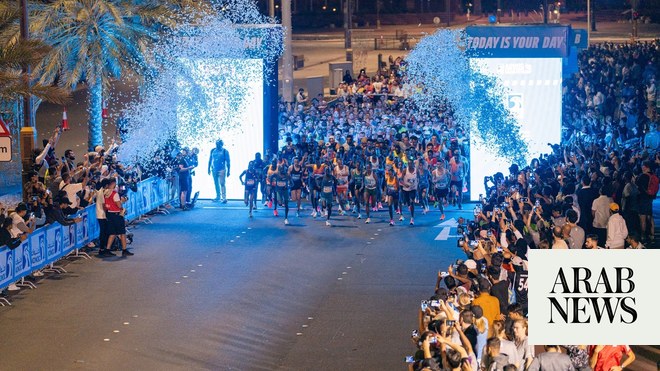
Moments after crossing the line without that familiar slap of winning tape on vest, Eliud Kipchoge tried to make sense of the biggest shock in London Marathon history. In truth, his version sounded even more discombobulating than what we had just witnessed on a bitter October Sunday in St James’s Park, as Shura Kitata came away with victory.
The cold had not seeped into Kipchoge’s skin and zapped his spirit, the Kenyan world record holder insisted. And nor had the biblical rain led to his first defeat for seven years. No – it was a blocked ear that had done for him.
“I got it in the last 15km,” Kipchoge explained, body shivering uncontrollably as he spoke. “I felt it was not normal so I tried to take in saliva to open the ear and just tried to breathe normally, but my right ear couldn’t open. That’s how it is. Then my hip and leg was really cramped. I tried to keep warm and make sure I finished.”
He paused, and then attempted a smile. “I’m really disappointed but this is sport,” he said. “It’s what normally happens in sport. It’s not the end of the world. It’s not suicide for Eliud Kipchoge to be beaten. I have more marathons. I will come back again.”
After a year in which the pandemic has flipped the world on its head, perhaps we should have been forewarned that the old certainties no longer held true. Still, it was shocking to see Kipchoge 2020ed so brutally.
Initially there were no signs of what lay ahead. The early pace was dawdling by elite standards, with the leading group through halfway in 62 mins 54 sec, but Kipchoge looked comfortable.
Yet this was not a normal marathon. Usually at some point in the second half of the race the Kenyan blasts away from the field. But with just four miles remaining there were still nine men in contention. It had become a game of chicken, with no one wanting to make the first move.
But when the Ethiopian Kitata stepped on the gas Kipchoge suddenly began to look uncomfortable, twitching and grimacing as he tried to keep up. And while he never gave up, he was dropped after 24 miles and could only trudge home in eighth in a modest 2:06:49, the second slowest time of his career.
Up ahead Kitata outlined his immense promise winning his first London Marathon in a thrilling sprint finish. After coming fourth last year, Kitata confessed that he had run out of energy during the final few miles because he had only eaten fruit for breakfast. This time he looked full of beans, easing towards the front with four miles to go, before holding off Kenya’s Vincent Kipchumba to win in 2:05:41.
“I am very happy to win this race, for my county, for my group, for my teammates,” said Kitata, who was without his coach Haji Adilo, who tested positive for Covid-19 last week.
The women’s race, however, failed to live up to its billing as the world record holder, Brigid Kosgei, comfortably saw off the world champion Ruth Chepngetich after breaking clear after 20 miles to win by over three minutes in 2:18:58.
By the last mile Chepngetich was running on fumes and in the final few strides the American Sara Hall was able to sprint past her to finish second in 2:22:01. It was the first time a non-African had made the London Marathon women’s podium since Japan’s Yukiko Akaba in 2013.
Afterwards Chepngetich admitted she had been affected by the temperatures, which struggled into double figures. True, it was not quite as cold as 2004 when it was just 5.3C at the start, but this day was certainly the wettest London Marathon in 39 years. “I just went into hunting mode,” said Hall. “It really made that last lap fly by.”
Meanwhile Mo Farah, who paced his fellow Brits Jonny Mellor and Ben Connor to an Olympic qualifying time, admitted he was stunned to see Kipchoge beaten.
“It was a shock for all of us. We had expected him to win by miles, considering what times he has run. But that happens, it’s sport. We are human, and you can have an off day.”
Yes, even Kipchoge.












